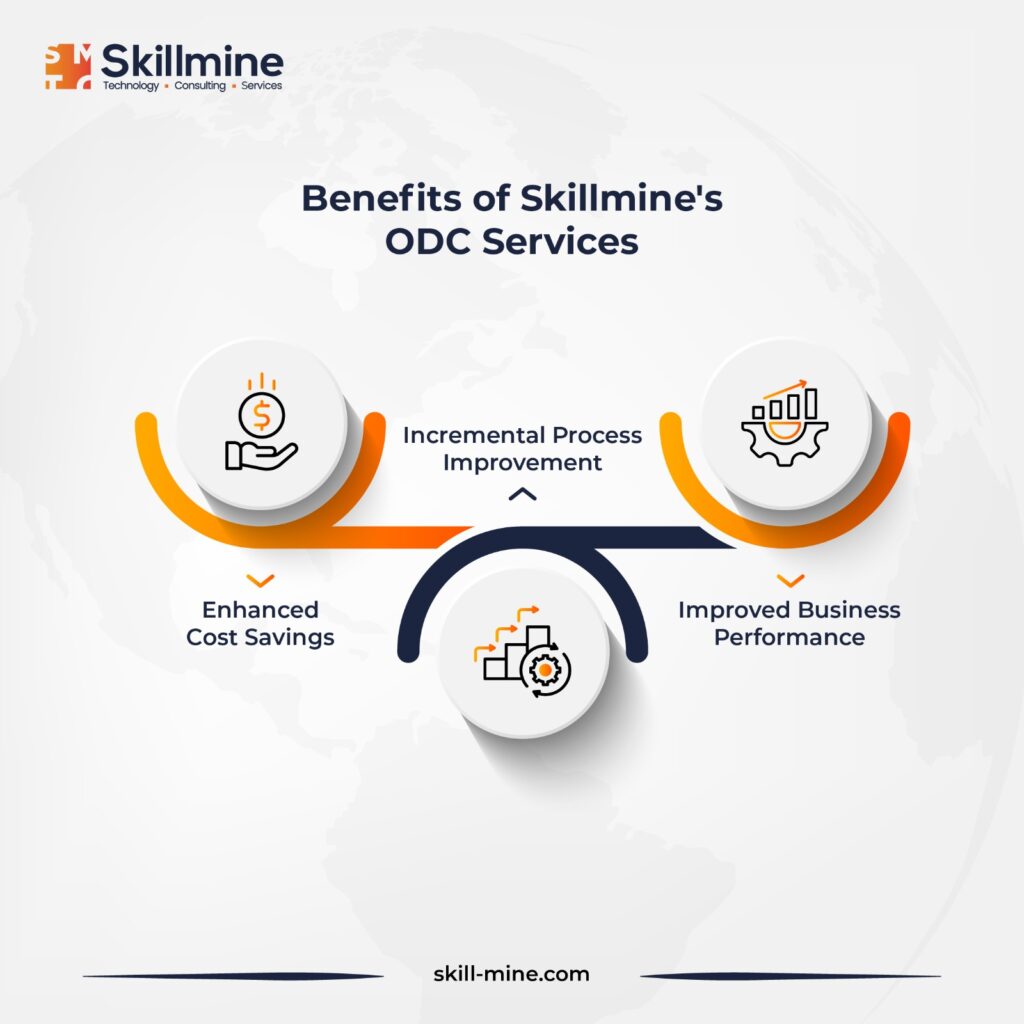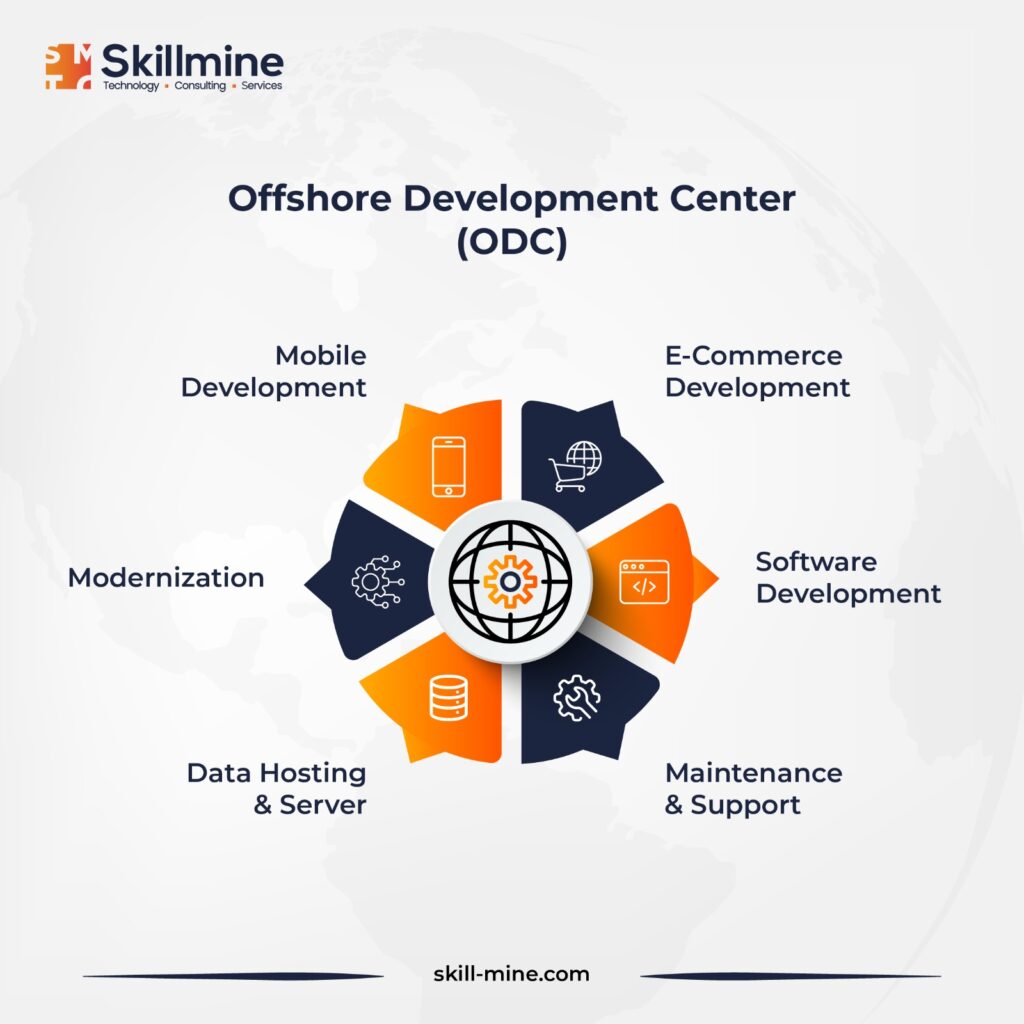A study from IT giant Deloitte claims that around 59% of the participating companies in its survey outsource to India, with a further 22% planning to do so soon. Traditionally, offshore development centers were predominantly employed as a strategy to achieve cost reductions without compromising the quality of software development. Nations like India, China, and the Philippines emerged as the preferred choices for businesses seeking to delegate software development tasks. This trend was driven by substantial cost savings, frequently surpassing 30%, and the availability of an extensive pool of skilled professionals. ODCs enable companies to access international talent, lower expenses, and expedite project schedules.
What are Offshore Development Centers?
An Offshore Development Center (ODC) represents a strategic collaboration between a company and an offshore service provider. This entails the establishment of a specialized team of proficient experts in a separate geographic region, tasked with cooperating and engaging in software development, IT ventures, or other specialized services. ODCs bring forth numerous benefits, including cost-efficiency, the ability to tap into a worldwide talent reservoir, heightened scalability, and the ability to maintain uninterrupted productivity around the clock.
Types of ODCs
Offshore Development Centers (ODCs) encompass various structures and approaches utilized by companies to handle software development, testing, and other IT-related endeavors. There are various ODC types, each characterized by its unique attributes and merits. Here are some prevalent ODC categories:
Proprietary Offshore Development Center: A proprietary ODC is an overseas subsidiary or an extended arm of a parent company situated in a foreign country. The parent organization initiates and oversees the ODC, which operates exclusively for the parent company’s projects. The ODC team members are direct employees of the parent entity.
Exclusive Offshore Development Center: In an exclusive ODC model, a third-party service provider establishes a dedicated facility for a specific client. The ODC team exclusively focuses on the client’s projects and adheres to the client’s stipulated guidelines and methodologies. The client maintains complete control over both the team and project management.
Hybrid Offshore Development Center: A hybrid ODC amalgamates features from both the proprietary and exclusive models. In this setup, the client establishes a subsidiary or presence in a different country while partnering with a third-party vendor to handle the management and operations of the ODC. This arrangement enables the client to harness the vendor’s expertise while retaining authority over the ODC’s functioning.
Build-Operate-Transfer (BOT) Offshore Development Center: The BOT model involves a collaboration with a third-party vendor to initially set up and operate the ODC. As time progresses, the client gradually assumes control of the ODC’s management and operations. This model furnishes a transition period for the client to establish their independent offshore development capabilities.
Virtual Offshore Development Center: A virtual ODC is a dispersed team model where team members are geographically dispersed and collaborate using diverse communication and collaboration tools. This model offers flexibility and access to global talent without the necessity for a physical establishment.
Managed Service Offshore Development Center: In a managed service ODC model, the vendor takes full responsibility for establishing and operating the offshore development center. The client outsources complete management and project delivery to the vendor, who provides the requisite infrastructure, resources, and expertise.

Need for Effective Communication in ODC
Creating effective communication pathways is essential for facilitating productive teamwork with your offshore team. Utilize technological platforms that support instant, real-time communication, such as video conferencing, project management software, and instant messaging. Consistently plan meetings and establish well-defined communication protocols to nurture a culture of efficient collaboration.
Here are some best practices for enhancing communication in offshore development centers.
- Establishing Communication Protocols
The foundation of effective communication lies in defining clear protocols. Create protocols that outline expectations regarding communication frequency, methods, and channels. Ensure that the offshore team comprehends and consistently adheres to these protocols.
- Leveraging Communication Technology
Harnessing technology enhances communication in offshore development center. Embrace tools facilitating collaboration, such as shared document repositories and screen sharing. Encourage the use of email and other asynchronous communication tools.
- Clarifying Roles and Responsibilities
Effective communication requires a clear delineation of roles and responsibilities. Craft detailed job descriptions for both onshore and offshore team members. Communicate these roles to the offshore team, ensuring a comprehensive understanding of their contributions.
- Emphasizing Cultural Awareness
Cultural awareness is crucial in offshore projects. Develop an understanding of the offshore team’s culture, customs, and values. Adapt communication styles to align with cultural norms, fostering sensitivity. Encourage cultural competence among onshore team members.
- Scheduling Regular Meetings and Updates
Regular meetings are vital for communication. Schedule sessions to discuss project progress, goals, and challenges. Utilize these meetings for updates and feedback, promoting open discussion and active participation. Employ project management software for tracking progress and milestones.
- Using Visual Aids
Visual aids enhance communication clarity. Employ diagrams, flowcharts, and visual tools for conveying complex concepts and processes. Offer examples of successful projects and best practices to illustrate desired outcomes. Encourage the use of visual aids by the offshore team.
- Encouraging Open Communication
Foster a culture of open communication, where team members freely share ideas, opinions, and concerns. Build trust and collaboration using feedback mechanisms to ensure inclusivity.
- Providing Prompt Feedback
Timely feedback is essential for effective communication in offshore delivery centers. Regularly provide feedback to the offshore team to clarify expectations and identify areas for improvement. Address issues promptly to prevent escalation and impact on project outcomes.
Essential Tools and Technologies for ODC Management
Efficiently overseeing an Offshore Software Development Center (ODC) necessitates the proficient utilization of diverse tools and technologies to enhance teamwork, communication, project oversight, and productivity. Here are some prominent tools and technologies often employed for ODC management:
Communication Tools
- Slack: A widely adopted messaging platform facilitating real-time communication, file sharing, and team cooperation.
- Zoom: A video conferencing application for conducting virtual meetings, presentations, and team dialogues.
- Microsoft Teams: An all-encompassing collaboration platform that integrates chat, video meetings, file sharing, and project management.
Project Management Tools
- Jira: A prevalent project management tool designed for agile software development, issue tracking, and task administration.
- Trello: An intuitive project management application utilizing boards, lists, and cards to monitor tasks and collaborate with team members.
- Asana: A versatile project management platform for task tracking, priority setting, and project progress monitoring.
Version Control Systems
- Git: A distributed version control system that streamlines code collaboration, change tracking, and code repository management.
- GitHub: A web-based platform for hosting Git repositories, promoting code reviews, and enabling collaborative development.
Collaboration Tools
- Google Workspace (formerly G Suite): A suite of productivity tools encompassing Google Docs, Sheets, and Slides, allowing real-time collaboration and document sharing.
- Microsoft Office 365: A comprehensive suite of productivity tools like Word, Excel, and PowerPoint, equipped with cloud-based collaboration features.
Virtual Machines and Containers
- VirtualBox: A virtualization tool for operating multiple operating systems on a single machine, valuable for testing and development purposes.
- Docker: A containerization platform that facilitates the development and deployment of lightweight, isolated software containers for efficient application rollout.
Issue Tracking and Bug Reporting Solutions
- Bugzilla: A web-based tool for monitoring and managing software defects, bugs, and feature requests.
- JIRA Software: An adaptable issue tracking system enabling teams to monitor and address project issues, bugs, and tasks.
Collaborative Design and Prototyping Platforms
- Figma: A cloud-based design application for crafting interactive prototypes, teaming up on UI/UX designs, and distributing design assets.
- InVision: A platform for fabricating interactive prototypes, collecting feedback, and cooperating on design projects.
Knowledge Sharing and Documentation Tools
- Confluence: A team collaboration and documentation utility empowering teams to produce, structure, and distribute knowledge.
- Notion: A versatile all-in-one workspace for notetaking, knowledge organization, task management, and collaboration.
By harnessing these tools and technologies, businesses can adeptly administer their Offshore Development Centers, simplify processes, encourage collaboration, and ensure the efficient execution of projects within globally dispersed teams.

Conclusion
Creating a thriving offshore delivery centers necessitates meticulous preparation, the choice of an appropriate partner, the cultivation of efficient communication, the formulation of a comprehensive project strategy, the encouragement of teamwork, the provision of training and integration, the incorporation of strong security protocols, and the continuous monitoring of performance. Skillmine’s ODC services adhere to these guidelines and help you unlock the full potential of your business.
Looking for expert technology consulting services? Contact us today.





